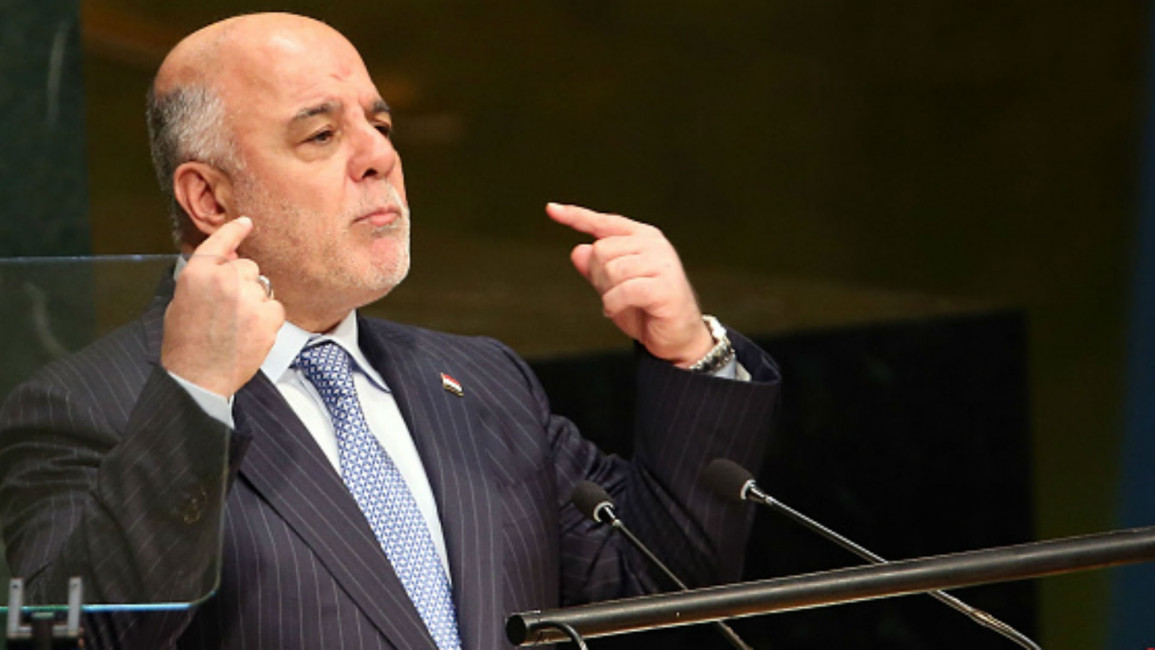Baghdad's anti-IS wall to be built despite conflicting statements
Baghdad's anti-IS wall to be built despite conflicting statements
Confusion reigns in the Iraqi capital as Iraq's prime minister backed a wall to defensive wall to shield Baghdad from IS attacks, just hours after he rejected the proposal.
2 min read
A change of heart: Abadi's spokesman said Baghdad embraces wall plans [Getty]
Despite contradictory messages from Iraq's prime minister, a defensive wall designed to protect the capital Baghdad from Islamic State group attacks appears to be given the green light.
Iraqi Prime Minister Haider al-Abadi rejected plans on Sunday for a wall to ring Baghdad.
Hours later, and the PM's spokesman said that Abadi had agreed to the proposal, which the government hopes will protect the capital from potential IS attacks.
When complated the wall will stretch 186-miles, and reach 10 feet-high.
The structure should dominate the city's suburbs, and the plan comes after a series of bomb blasts linked to the extremist group rocked Baghdad last week.
"The wall of Baghdad is a security measure with no political motives," spokesman Saad al-Hadithi said.
"The wall seeks to identify the entry and exist points to the city of Baghdad to limit breaches that may threaten the country's capital."
Earlier, Abadi's office released a statement which conflicts with the prime minister's new view:
Iraqi Prime Minister Haider al-Abadi rejected plans on Sunday for a wall to ring Baghdad.
Hours later, and the PM's spokesman said that Abadi had agreed to the proposal, which the government hopes will protect the capital from potential IS attacks.
When complated the wall will stretch 186-miles, and reach 10 feet-high.
The structure should dominate the city's suburbs, and the plan comes after a series of bomb blasts linked to the extremist group rocked Baghdad last week.
"The wall of Baghdad is a security measure with no political motives," spokesman Saad al-Hadithi said.
"The wall seeks to identify the entry and exist points to the city of Baghdad to limit breaches that may threaten the country's capital."
Earlier, Abadi's office released a statement which conflicts with the prime minister's new view:
"Baghdad is the capital for all Iraqis and it's not possible for a wall or a fence to isolate the city."
Baghdad has suffered almost daily bombings and attacks aimed both at the security forces and the country's Shia majority.
In recent months, government offices, public spaces and security centres have been targeted by the militants.
An attack on a shopping centre last month left 18 dead.
January was a bloody month for the capital on recent times with 299 civilians killed and 785 wounded.
UN figures show that in the past month alone 490 civilians were killed and more than 1,150 wounded across Iraq due to attacks.


![President Pezeshkian has denounced Israel's attacks on Lebanon [Getty]](/sites/default/files/styles/image_684x385/public/2173482924.jpeg?h=a5f2f23a&itok=q3evVtko)



 Follow the Middle East's top stories in English at The New Arab on Google News
Follow the Middle East's top stories in English at The New Arab on Google News


